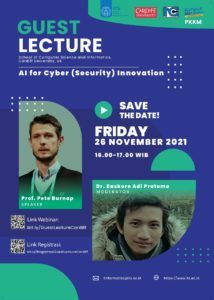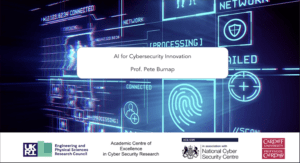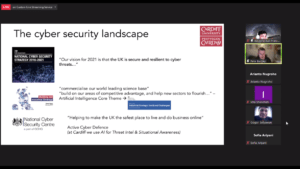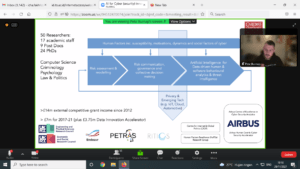Guest Lecture on AI for Cyber (Security) Innovation by Prof Pete Burnap
News
The development of modern technologies have been integrated into every facet of life and the threat to cyber security is persistent and continually evolving. Business, government and the public must constantly be alert to the level of risk if they are to succeed in detecting and resisting the threat of cyberattack, so the Department of Informatics invited Prof. Pete Burnap from the School of Computer Science and Informatics, Cardiff University, UK. He was the speaker on this guest lecture who was presenting about “AI For Cybersecurity Innovation”. This guest lecture held by Program Kompetisi Kampus Merdeka on Friday, 26th of November 2021 at 16.00 WIB through a Zoom meeting. The moderator of this guest lecture was Dr. Baskoro Adi, he is a lecturer at Department of Informatics Engineering, Institut Teknologi Sepuluh Nopember. This guest lecture was attended by approximately 70 participants.

Prof. Pete Burnap is Professor of Data Science & Cybersecurity at Cardiff University. He is Director of Cardiff’s NCSC/EPSRC Academic Centre of Excellence in Cyber Security Research (ACE-CSR). He also leads AI for cybersecurity research at Airbus DTO on a part-time secondment basis and he have been involved in grants in worth in excess of £23m, leading large awards from EPSRC, ESRC and industry on the topic of cyber security analytics – the fusion of AI, Cybersecurity and Risk. Prof. Pete Burnap sit on the UK Government (DCMS/BEIS) AI Council.


As an introduction, Prof. Pete Burnap explains the UK cyber security landscape that the UK government has a vision for 2021 such that the UK is safe and resilient to cyber threats. The UK government has an active cyber defense by use of artificial intelligence and spreading guidance to everyone, from individual small companies to large companies, on how to identify the threats that take them down and the risks of them. So, the active cyber defence at Cardiff University also uses artificial intelligence for threat intel and situational awareness.

Prof Pete Burnap also explained that their research has interdependent themes, they are: (1) Risk assessment and modelling (2) Risk communication, governance and collective decision making (3) Artificial intelligence for data-driven human and software behavioural analytics and threat intelligence (4) human factor, susceptibility to cyber attacks, motivations, dynamics and social factors of cyber-crimes (5) Privacy of emerging technologies. Prof Pete Burnap said that the plot of the research will way back round to risk assessment, because philosophy from the research is not just to raise awareness of attacks but also to tell how that may impact and what might be the risk be, how to communicate that risk and how do make decisions on what to do based on an artificially intelligent alert. Prof. Pete Burnap also presented one of the case study, that is about Advanced Security Operation Centre (SOC) at Airbus. Lessons learned from in that the case study is how to distinguish malicious and benign software. It started from the feature map of the malicious activities and then moved on to the comparison between machine activities and API calls. The research actually shows that machine activities provide better consistency at distinguishing malware and benign software. Then, we also see how the early prediction and can predict malicious activity in the first five seconds with the accuracy of about 94 percent.

At the end of the session Mr. Baskoro Adi as moderator expressed his gratitude for the informative talk and taking the time to attend guest lectures and provide useful knowledge. He hoped to be able to do guest lectures again next time.
Latest News
-
Sensor for pH and Flow Speed Detection using Pt Thin Film Reference Electrode
Intelligent Information Management (MCI) Lab, Department of Informatics Engineering, Institut Teknologi Sepuluh Nopember (ITS) held a guest lecture by
-
Guest lecture ” Securing Indonesia’s Future through Cybersecurity Innovation and AI “
The US Embassy in collaboration with Department of Informatics will held a guest lecture ” Securing Indonesia’s Future through
-
Higher IT School graduates from Indonesia received their diplomas
Tomsk State University has awarded diplomas to graduates of the Higher IT School. Diplomas were awarded not only to





